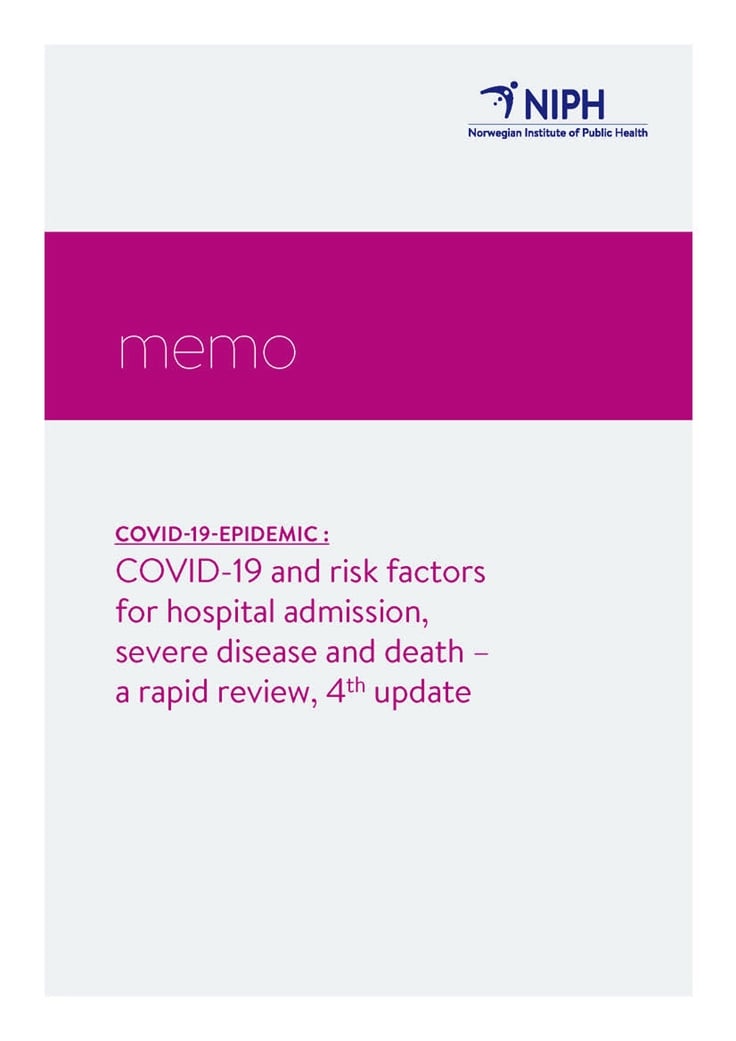COVID-19 and risk factors for hospital admission, severe disease and death – a rapid review, 4th update
Note
|Published
This rapid review is the 4th update in the series “COVID-19 and risk factors for hospital admission, severe disease and death” replacing our previous report published on November 15th, 2020. In this review, only peer-reviewed population-based studies with more than 5000 laboratory test positive COVID-19 cases are included.
Key message
This rapid review is the 4th update in the series “COVID-19 and risk factors for hospital admission, severe disease and death” replacing our previous report published on November 15th, 2020. In this review, only peer-reviewed population-based studies with more than 5000 laboratory test positive COVID-19 cases are included.
The findings are based on searches in MEDLINE and Embase on March 31st, 2021, updated by a neural network search in Microsoft Academic Graph on April 14th, 2021. One researcher screened the search results, and two researchers selected studies for inclusion and synthesised the results. Experts in the field assisted with study inclusion and provided helpful input during the review process. In the current situation, there remains an urgent need for identifying the most important evidence timely. Hence, we opted for this rapid approach despite an inherent risk of overlooking evidence or making misguided judgements.
We included ten studies that reported results from multivariate analyses of demographic and medical risk factors. We excluded risk factors that constituted laboratory findings, clinical signs and symptoms of COVID-19. Three studies were from UK, and one from Denmark, Norway, Mexico, South Korea, Spain, Sweden, and from USA. Four out of ten studies only reported data on the adult population.
Meta-analysis was not feasible, and the main results of this rapid review are therefore presented in tabular form and narratively. Risk factors associated with (i) hospitalisation, (ii) severe/critical disease, and (iii) COVID-19-related death are reported separately. The included studies provide a granular overview of risk factors based on population-based studies. Although our findings are representative for large parts of the population, some groups are less well represented, especially people with rare conditions. For example, in this update, more studies included populations under 18 years, but the results may still not be representative for this population group as the total number of registered incidents remain small. Other population and patient groups, which are not captured by the included studies, will require further research.
Risk factors for hospitalisation related to COVID-19
Six studies assessed risk factors for hospitalisation related to COVID-19. Overall, age, comorbidities and severity of comorbidities were found to be strong predictors of hospital admission. Five out of six studies provided a granular overview of adjusted hazard ratios (HRs)/odds ratios (ORs) for a broad selection of comorbidities, conditions and ongoing treatments. Four studies showed a clear dose response relationship between increasing age and risk of hospital admission. Four studies reported an increased adjusted HR/OR/ relative risk (RR) for hospital admission in men and for people overweight and obese. Based on three studies, most non-whites or foreign born were at increased risk of admission. Two studies reported increasing risk of admission by number of co-existing comorbidities. Severe kidney disease, diabetes, ongoing chemotherapy, severe immunodeficiency, heart failure, and Down syndrome stand out with a greater associated risk of hospital admission (OR/HR >=3).
Risk factors for developing more severe or critical COVID-19 (ICU treatment)
Four studies assessed risk factors for ICU admissions related to COVID-19. Two studies provided a detailed overview of comorbidities and demographic factors, and two studies presented mainly demographic factors. Overall, age was found to be the strongest predictor of severe COVID-19, with increasing risk until the late 60-70s, and then falling again. This admission pattern may reflect differing treatment approaches than severity of disease. Furthermore, male sex, diabetes, asthma, chronic kidney disease, tuberculosis and Down syndrome were associated with increased risk for ICU admission related to severe COVID-19.
Risk factors for COVID-19-related death
Nine studies assessed risk factors for COVID-19-related death. All studies provided a granular overview of risk factors. Overall, increasing age was found to be the strongest predictor of COVID-19-related death, while increased risk was also observed for male sex, number of and severity of most comorbidities. Ethnicity other than white was consistently associated with modest but increased risk of death, with Blacks having the highest risk of death. Two studies found increasing risk of death with increasing degree of deprivation. Kidney disease, diabetes mellitus type I and II, dementia, ongoing chemotherapy, organ transplantation, severe immunodeficiency, major psychiatric disorders treated with antipsychotics, cerebral palsy and Down syndrome were reported as the strongest predictors of COVID-19 related death (OR/HR >=3). Most singular comorbidities were associated with an increased risk of death, but mixed results were observed for obesity.
Conclusion
Through this 4th revision, previous findings are strengthened and expanded. The elderly are clearly the main group at risk of hospital admission, severe disease, and death if infected by COVID-19. Most comorbidities appear to increase risk, with increasing number of and severity of comorbidities contributing to a further increase in the overall risk. Male sex, non-white ethnicity and deprivation are also associated with increased risk.


